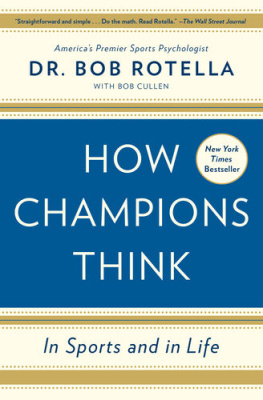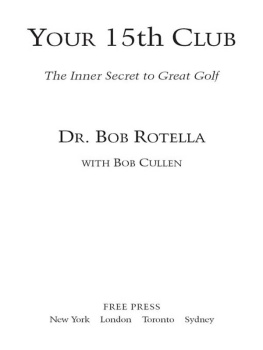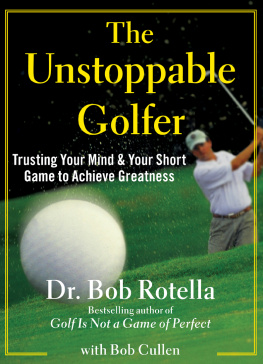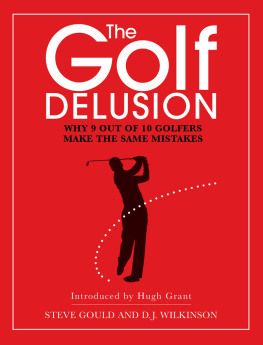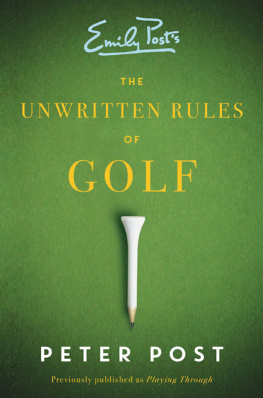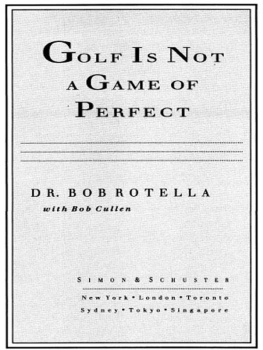
ALSO BY DR. BOB ROTELLA
BOOKS
GOLF IS NOT A GAME OF PERFECT
GOLF IS A GAME OF CONFIDENCE
THE GOLF OF YOUR DREAMS
LIFE IS NOT A GAME OF PERFECT
PUTTING OUT OF YOUR MIND
AUDIOTAPES
PLAYING TO WIN-GOLF, BUSINESS, LIFE
GOLFING OUT OF YOUR MIND
PUTTING OUT OF YOUR MIND
FOCUSING YOUR MIND FOR COMPETITION
VIDEOTAPE
PUTT TO WIN (WITH BRAD FAXON)
TH1 GOLFER1 MIND
Play to Play Great
DR. BOB ROTELLA
WITH Bob Cullen
FREE PRES1 NEW YORK LONDON TORONTO SYDNEY
FREE PRES1 A Division of Simon & Schuster, Inc.
1230 Avenue of the America1 New York, NY 10021 www.SimonandSchuster.com
Copyright 2004 by Robert J. Rotella
All rights reserved1 includiing the right of reproductio1 in whole or in part in any form.
Free Press and colophon are trademark1 of Simon & Schuster, Inc.
Designed by Level C, Inc.
Manufactured in the United States of America
10 9 8 7
Library of Congress Cataloging-in-Publication
Control No. 2004058353
ISBN 0-7432-6975-6
eISBN-13: 978-1-4391-0339-5
ISBN-13: 978-0-7432-6975-9
For information regarding special discounts for bul1 purchases, please contact Simon & Schuster Special Sales a1 1 -800-456-6798 or business@simonandschuster.com
To the memory of Davis Love, Jr.
Thanks to my wife, Darlene, and my daughter, Casey1 who offer so much support an1 give so freely of their time.
CONTENTS
INTRODUCTION
MY TOP TEN
All of the rings and all of the money and all of th1 color and displaythey linger only in memory. Th1 spirit, the will to win and excel, these are the thing1 that endure. The quality of any mans life is the ful1 measure of his commitment to excellence and t1 victory, regardless of what field he might be in.
Vince Lombardi
I teach the psychology of greatness. The way I teach it varies.
When I first begin to work with a client, I like to arrange for him or her to come to my home in Virginia. We spend a couple of days together, some of it in conversation and some of it on the golf course. I get to know the client thoroughly. He is immersed in my ideas about using the mind to achieve greatness, about playing to play great, about bringing the best possible attitude to play and practice.
After that, the nature of my contact with my clients may change. Some of them still like to come to Virginia periodically for a long session. But others prefer shorter talks on specific issues and problems that have arisen in their careers. I might meet them for lunch or dinner in a town thats hosting a golf tournament. We might chat on the putting green or the practice range. Sometimes we talk over the phone while hes in a hotel room and Im at an airport.
This book is akin to that second category of counseling sessions. In fact, it arises partly from them. When I talk to a player who says, Doc, Im having trouble trusting my swing, I review the fundamental ideas about the necessity of trust and why it helps a golfer produce the best shots hes capable of making. Players have often wished I had a book, a handbook if you will, that could serve the same function and reinforce those conversations. This is that book.
If youre completely unfamiliar with sports psychology as I teach it and with its application to golf, you might want to consult one of my earlier books, like Golf Is Not a Game of Perfect. Its my primer on how great golfers think.
Often what I hear from readers of those earlier books is something to the effect that, Your ideas were really helpful right after I read them, Doc, but lately they dont seem to work well. What that tells me is not that the ideas have gotten less effective. It tells me that over time, the reader has forgotten some of them. Or hes reverted to old ways of thinking, perhaps without realizing it.
This doesnt surprise me. The players with whom I work individually are prone to the same problem. If the issue is trusting the swing for instance, they might be able to do it very well in the months after we have our initial session. Its one of the things I stress. But over time, a golfer is exposed to a barrage of contradictory ideas. People are telling him to think about the way his hands cock the club or the ratio between his hip turn and his shoulder turn. If hes a professional, he gets this sort of advice from renowned instructors on the practice range at Tour venues. If hes an average player, he gets it from magazines and television. Pretty soon, instead of trusting his swing and thinking about his target, hes thinking about pronation while hes on the golf course. Hes trying to swing while his mind sorts through bits and pieces of conflicting advice. Thats difficult to do.
When this happens with one of my established clients, I review the essentials with him. This book is an effort to do the same thing for readers. Its a distilled version of what I teach.
So often, in those telephone sessions, I return to ten fundamental points of good golf thinking. If Moses hadnt already copyrighted the name, I would be tempted to call them my ten commandments for playing great golf. I know that if a player adheres to them, he can find out exactly how low his skills are prepared to take him on any given round. Here they are:
Play to play great. Dont play not to play poorly.
Love the challenge of the day, whatever it may be.
Get out of results and get into process.
Know that nothing will bother or upset you on the golf course, and you will be in a great state of mind for every shot.
Playing with a feeling that the outcome doesnt matter is almost always preferable to caring too much.
Believe fully in yourself so you can play freely.
See where you want the ball to go before every shot.
Be decisive, committed, and clear.
Be your own best friend.
Love your wedge and your putter.
These ideas may sound obscure or strange to you. If you finish reading this book, they wont. I intend to explain each of them, and by the time Im done, you will understand why theyre so important. I hope youll want to re-read them often.
The first person who suggested the format for this book to me was the late Davis Love, Jr. He and I worked together on the staff of Golf Digest Schools before his tragic death in was plane crash in 1988. He told me once that he wished there was a book of instruction on the mental side of golf, broken down into topics. He thought that a player could carry the book with him or keep it close by. When he needed to refresh his thinking about a particular issue, he could consult the book, read it for a few minutes, and come away with sound advice aimed at his problem. Not only do I owe the idea behind this book to Davis Love, Jr., I owe him so much more. He taught me a lot about golf, and he was a great friend. Thats why the book is dedicated to him.
I hope readers will use this book as Davis Love, Jr., envisioned. You might want to read it in its entirety first. After your first consultation, I intend the hook to he available as a handbook. You may want to consult some chapters, like A Golfing Philosophy on a regular basis, because its so easy to lose track of the fundamental ideas in that chapter. If youre getting ready for a tournament and you feel the need for some advice on putting, for example, or acceptance, or game plan, you can go right to the chapters on those topics. Read as much as you need. Use the thoughts at the end of each chapter for a quick refresher. Put the book aside and come back to it when you need it again.
Next page

